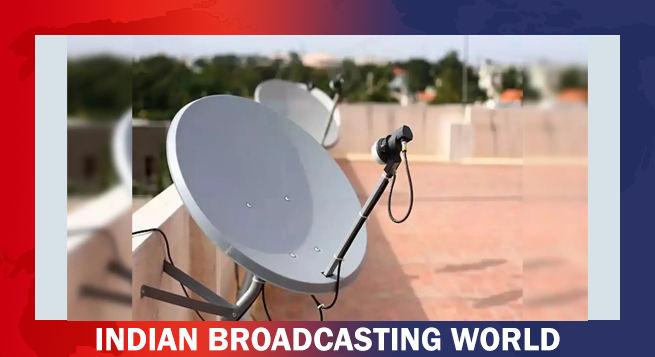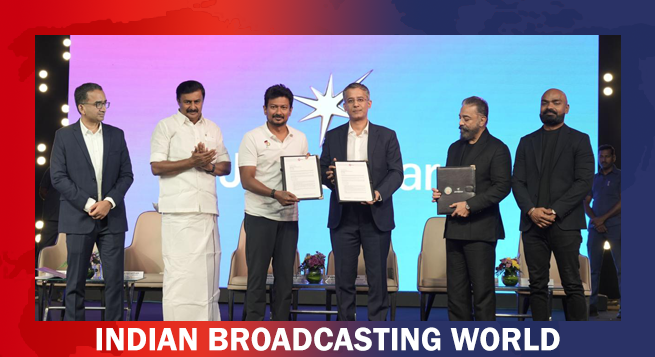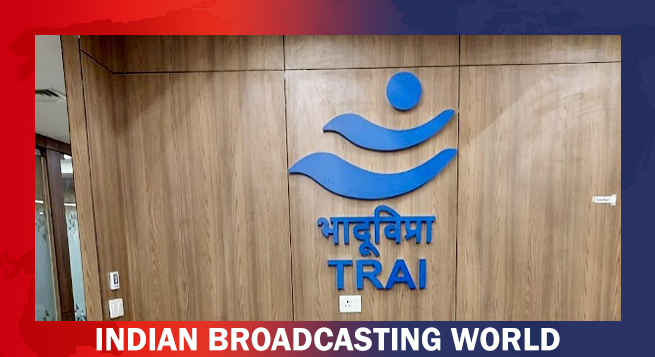Saankhya Labs, a subsidiary of Tejas Networks, Free Stream Technologies, incubated at Indian Institute of Technology (IIT), Kanpur, and US-based Sinclair, Inc. have announced the companies are collaborating to design and launch a variety of value-for-money mobile phones with augmented direct-to-mobile (D2M) broadcast capability.
These consumer devices will be powered by Saankhya’s Pruthvi-3 ATSC 3.0 chipsets — the next step in India’s semiconductor journey and Atmanirbhar Bharat (self-reliance), a joint press release by the two companies issued from Bengaluru and Baltimore stated.
Saankhya Labs has done pioneering work in bringing to market broadcast radio heads for cellularization of single frequency networks and building the world’s first D2M smartphone (Mark ONE) reference design. For over two years, next generation D2M technology has undergone trials and field validation in Bengaluru, Delhi and the United States.
Now the partnership is commencing consumer trials for multi-media delivery and datacasting use cases. This development, leveraging the first ‘Designed in India’ chip, comes on the heels of a strong semiconductor push by the PM Narendra Modi led government in India, the media statement added.
Consumer trials will be conducted on a variety of D2M devices comprising smartphones, USB dongle accessories, STB/gateways and a low cost feature phone. They will demonstrate interworking with mobile system-on-a-chip from suppliers with a collective global market share exceeding 70 percent.
Parag Naik, Founder and CEO of Saankhya Labs, in a statement said, “As India’s foremost fabless chip company, Saankhya is delighted to see this path breaking D2M technology getting one step closer to launch. For rapid proliferation of the device ecosystem, we are actively working with a number of mobile device suppliers to develop solutions that integrate our award-winning Software Defined Radio chipsets.”
Chris Ripley, President and CEO of Sinclair, said, “I firmly believe that low-cost feature phones will be the biggest driver for domestic demand in India since 4G/5G, incentivizing over 300 million feature phone users to shift to broadcast-enabled phones at a low incremental cost. We expect to launch these devices for trials in the first half of 2025. This competitive market segment can be expected to produce affordable phones for the Indian and global markets.”
“ATSC 3.0’s time and frequency interleaving feature provides excellent mobile performance, which is why we played a foundational role in the creation and deployment of the standard for next generation broadcast,” he added.
Sumeet Nindrajog, Director of FreeStream said, “Leading mobile brands clearly see the compelling consumer value proposition in D2M service offerings and are gearing up to scale to the needs of the Indian marketplace when deployment takes off. D2M will ride on the tremendous momentum to expand the mobile technology supply chain in India. As India’s first chips-to-platform deep tech start-up, FreeStream is working on putting together a D2M ecosystem that will realize PM Modi’s vision of India’s Techade.”
Incubated at the prestigious Indian Institute of Technology (IIT) Kanpur, Free Stream Technologies Pvt. Ltd. is India’s first and only ‘chips to platform’ tech start-up focused on developing, deploying and managing nationwide network infrastructure for cutting-edge D2M broadcast technology and related platform services.
 Govt. not considering rules for use of AI in filmmaking: Murugan
Govt. not considering rules for use of AI in filmmaking: Murugan  DTH revenue slide to ease to 3–4% this fiscal year: Report
DTH revenue slide to ease to 3–4% this fiscal year: Report  At Agenda Aaj Tak, Aamir, Jaideep Ahlawat dwell on acting, Dharam
At Agenda Aaj Tak, Aamir, Jaideep Ahlawat dwell on acting, Dharam  JioHotstar to invest $444mn over 5 years in South Indian content
JioHotstar to invest $444mn over 5 years in South Indian content  Standing firm, TRAI rejects DoT views on satcom spectrum fee
Standing firm, TRAI rejects DoT views on satcom spectrum fee  ‘Dominic and the Ladies’ Purse’ premieres on ZEE5 Dec 19
‘Dominic and the Ladies’ Purse’ premieres on ZEE5 Dec 19  Amazon announces 2 new Lara Croft games; one set in India
Amazon announces 2 new Lara Croft games; one set in India  India marks strong M&E presence at FOCUS London ’25
India marks strong M&E presence at FOCUS London ’25  Nawazuddin, director Trehan on ‘Raat Akeli Hai’ cop universe
Nawazuddin, director Trehan on ‘Raat Akeli Hai’ cop universe  Govt walking tightrope on fighting misleading info, creative freedom
Govt walking tightrope on fighting misleading info, creative freedom 









